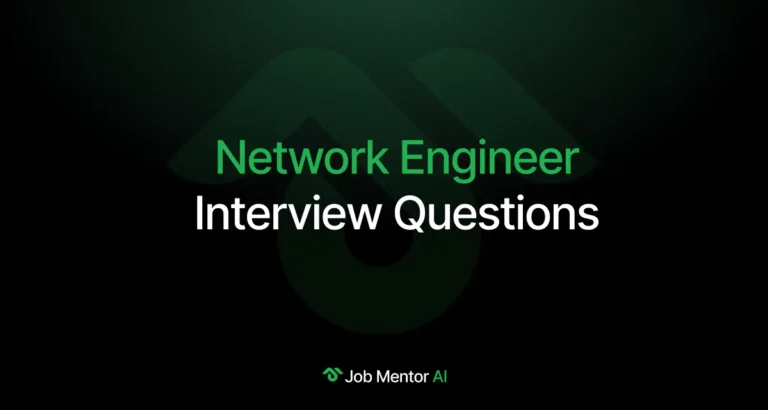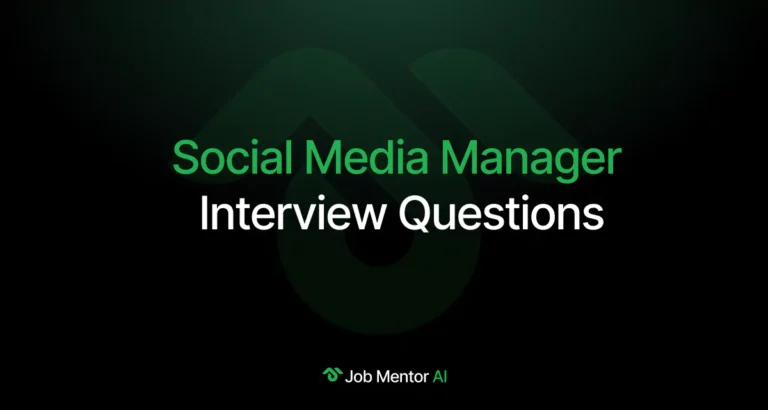Top 25 Program Manager Interview Questions and Answers
Preparing for a Program Manager interview can be challenging, but understanding the key questions is a great place to start. In this guide, we’ve compiled the top 25 Program Manager interview questions and answers, including strategic and technical program manager interview questions, along with expert insights and answers to help you stand out and succeed in your interview.

What Does a Program Manager Do?
A Program Manager plays a critical role in managing multiple related projects, ensuring they align with the overall business goals. Unlike a Project Manager, who focuses on individual tasks and timelines, a Program Manager looks at the bigger picture. Their responsibilities include:
- Strategic planning and execution of programs.
- Aligning multiple projects to business objectives.
- Cross-functional collaboration with different departments.
- Monitoring KPIs and metrics to ensure progress.
- Risk management and resolving conflicts across projects.
Program Managers often act as the bridge between upper management and project teams, requiring a blend of leadership, communication, and organisational skills. With increasing demand in industries such as tech, finance, and healthcare, Program Managers are also turning to Mock Interview Practice tools to prepare confidently.
25 Interview Questions for Program Manager
Here are the top 25 Program Manager interview questions often asked by recruiters and hiring managers:
List of Questions for Program Manager
1. How do you define success for a program?
2. How do you handle changes in program scope?
3. How do you manage cross-functional teams?
4. Describe your experience with budgeting and resource allocation.
5. How do you prioritise tasks across multiple projects?
6. Tell us about a time when a project in your program failed.
7. How do you track progress across different projects?
8. What tools do you use for program management?
9. How do you align program goals with company objectives?
10. Describe a conflict you managed between team members.
11. What’s the biggest risk you’ve encountered in a program, and how did you handle it?
12. How do you ensure stakeholder communication remains consistent?
13. Describe your experience with agile and waterfall methodologies.
14. How do you deal with underperforming team members?
15. What KPIs do you track for program success?
16. Have you ever managed global or remote teams?
17. How do you keep teams motivated over long program timelines?
18. Tell us about a time you had to make a difficult decision as a Program Manager.
19. How do you evaluate whether a program should continue or be terminated?
20. What’s your approach to managing dependencies between projects?
21. How do you handle stakeholder disagreements?
22. How do you manage vendor relationships and third-party services?
23. How do you present program status updates to executives?
24. Can you describe a complex problem you solved in a previous program?
25. How do you stay updated with industry trends and best practices?
1. How do you define success for a program?
Why you might get this question:
Interviewers want to assess how you measure outcomes and whether your understanding of success aligns with business goals.
How to Answer:
Focus on both tangible outcomes (on-time delivery, within budget) and intangible benefits (stakeholder satisfaction, alignment with strategic goals). Mention any metrics or KPIs you track to evaluate success.
Example Answer:
“I define program success based on whether it meets its strategic objectives while staying within scope, time, and budget constraints. I also evaluate success through stakeholder satisfaction, ROI, and how the outcomes contribute to long-term business goals. For instance, in my previous role, we delivered a digital transformation program six weeks ahead of schedule, increasing customer engagement by 25%.”
2. How do you handle changes in program scope?
Why you might get this question:
Scope changes are common in large programs. Employers want to know how you adapt without compromising program integrity.
How to Answer:
Show that you use change management processes and risk assessment. Emphasise communication and documentation.
Example Answer:
“I use a structured change control process that includes impact analysis, stakeholder review, and formal approval. When a scope change is requested, I assess how it affects the timeline, cost, and resources, then communicate the potential trade-offs before making any decision.”
3. How do you manage cross-functional teams?
Why you might get this question:
Program Managers work across different departments, so collaboration and leadership skills are key.
How to Answer:
Explain how you build alignment, encourage communication, and resolve conflicts. Mention tools or techniques you use.
Example Answer:
“I set clear roles, responsibilities, and expectations from the start. I hold regular sync-ups and use collaboration tools like Slack and Trello. I also ensure transparency in decision-making and encourage open feedback to maintain cohesion across functions.”
4. Describe your experience with budgeting and resource allocation.
Why you might get this question:
Program Managers often handle large budgets and must allocate resources efficiently.
How to Answer:
Discuss any budgeting tools you use, how you forecast expenses, and how you manage trade-offs.
Example Answer:
“In a previous program, I managed a $2M budget. I created detailed resource allocation plans, tracked spending weekly, and regularly communicated with finance to avoid surprises. When unforeseen costs came up, I reallocated funds from non-critical tasks while keeping leadership informed.”
5. Tell us about a time when a project in your program failed.
Why you might get this question:
Interviewers want to see how you respond to setbacks and what lessons you’ve learned.
How to Answer:
Be honest, but focus on how you addressed the issue and what you learned to prevent future failures.
Example Answer:
“One project failed due to vendor delays that weren’t accounted for in the initial risk plan. I took responsibility and improved our risk management process by including third-party performance indicators and creating more flexible project timelines moving forward.”
6. How do you track progress across different projects?
Why you might get this question:
To understand your ability to monitor and report on multiple projects simultaneously.
How to Answer:
Mention the tools, dashboards, or reporting methods you use to track and visualise progress.
Example Answer:
“I use dashboards built on tools like Jira and Trello to monitor milestones. Weekly status meetings with team leads ensure risks are identified early. I also consolidate key updates into a centralised report for stakeholders, keeping everyone aligned and ready to adjust plans as needed.”
7. How do you prioritise tasks in a program with multiple deadlines?
Why you might get this question:
To evaluate your time management and decision-making skills when managing competing priorities.
How to Answer:
Talk about how you assess impact, urgency, and resource availability when prioritising.
Example Answer:
“I assess each task based on urgency, business impact, and dependencies. I use MoSCoW or RICE frameworks and ensure alignment with strategic goals. This helps me focus on high-value tasks while adjusting priorities when deadlines shift unexpectedly.”
8. Describe a time you had to manage conflicting stakeholder expectations.
Why you might get this question:
To understand your communication and conflict resolution skills.
How to Answer:
Explain how you listened, aligned priorities, and negotiated a solution that addressed different concerns.
Example Answer:
“I once had engineering wanting speed and marketing pushing for perfection. I held a joint session to align on MVP features and timelines. We agreed on phased releases, satisfying both parties and keeping project goals intact.”
9. What’s your approach to risk management?
Why you might get this question:
To assess how well you anticipate, mitigate, and respond to potential project risks.
How to Answer:
Discuss identifying risks early, evaluating impact, and having mitigation plans.
Example Answer:
“I create a risk register at project start, identifying potential blockers. I rate each for impact and likelihood, then plan responses. Regular reviews keep risks visible and allow timely interventions if issues escalate.”
10. How do you ensure effective communication across teams?
Why you might get this question:
To gauge your ability to maintain transparency and alignment within and between teams.
How to Answer:
Share how you use communication tools, regular updates, and feedback loops.
Example Answer:
“I set up recurring stand-ups, weekly reports, and shared dashboards. Slack channels or Teams groups keep teams synced. I also encourage feedback loops to ensure information flows both ways across departments.”
11. How do you manage scope creep in a project?
Why you might get this question:
To assess your ability to control project scope and maintain focus.
How to Answer:
Explain how you define the scope at the beginning and manage changes carefully.
Example Answer:
“I establish clear project boundaries at the outset, using a scope document. When new requests arise, I assess their impact on timelines and resources before approval. I work closely with stakeholders to balance needs while protecting the original project goals.”
12. Can you describe a project where you had to manage tight budgets?
Why you might get this question:
To evaluate your ability to deliver projects efficiently within budget constraints.
How to Answer:
Describe the project, how you monitored spending, and ensured the project was still delivered successfully.
Example Answer:
“I once led a product launch with a tight budget. I prioritized essential features and identified areas to reduce costs, like outsourcing certain tasks. Regular budget tracking and transparent reporting kept the project on track without sacrificing quality.”
13. How do you handle a situation when a project is falling behind schedule?
Why you might get this question:
To assess how you deal with delays and adapt plans to keep projects on track.
How to Answer:
Talk about how you analyse the situation, communicate with stakeholders, and re-align the team to recover.
Example Answer:
“When a project is behind, I first assess the causes of the delay. Then, I communicate with the team to brainstorm solutions, like reallocating resources or adjusting timelines. I keep stakeholders informed about changes and ensure the revised plan is realistic.”
14. How do you build and maintain relationships with vendors?
Why you might get this question:
To test your vendor management and communication skills.
How to Answer:
Discuss how you establish expectations, maintain regular communication, and manage performance.
Example Answer:
“I establish clear expectations and timelines upfront with vendors. Regular check-ins and transparent communication help ensure both sides remain aligned. If issues arise, I address them quickly to prevent delays, while fostering a positive, long-term relationship.”
15. What strategies do you use to manage cross-functional teams?
Why you might get this question:
To gauge your leadership and coordination skills across diverse teams.
How to Answer:
Describe how you foster collaboration, set common goals, and align team members from different functions.
Example Answer:
“I establish shared goals and ensure open communication across teams. Regular cross-functional meetings help align priorities. I also encourage knowledge-sharing to leverage each team’s expertise, ensuring everyone is working toward the same vision.”
16. How do you handle conflicts within your team?
Why you might get this question:
To assess your conflict resolution skills and ability to manage team dynamics.
How to Answer:
Explain your approach to listening, mediating, and finding win-win solutions.
Example Answer:
“I listen to all parties involved, making sure everyone feels heard. I mediate to identify common ground and work toward a solution that addresses the concerns of both sides. I ensure the team remains focused on the project’s success, not individual issues.”
17. Can you explain your experience with budget forecasting for large programs?
Why you might get this question:
To assess your financial management skills in program management.
How to Answer:
Discuss your experience with estimating costs, monitoring budgets, and adjusting forecasts.
Example Answer:
“I have experience in creating and managing budgets for large programs by forecasting costs based on historical data, resource needs, and risks. I regularly review expenses against forecasts and make adjustments as needed to ensure the program stays within budget.”
18. How do you ensure that your projects meet quality standards?
Why you might get this question:
To understand your approach to maintaining high-quality outputs in your projects.
How to Answer:
Explain how you define quality criteria, monitor progress, and ensure testing.
Example Answer:
“I establish clear quality criteria at the start and ensure all deliverables meet them through regular checks and testing. I involve stakeholders early to align on expectations and ensure the project’s quality stays consistent from start to finish.”
19. What’s the most challenging program you’ve managed?
Why you might get this question:
To assess your experience with complex, multi-faceted projects.
How to Answer:
Describe a complex program, the challenges you faced, and how you overcame them.
Example Answer:
“The most challenging program I managed was a cross-platform software launch. We had tight deadlines, multiple teams, and external dependencies. I kept the team aligned through clear communication, agile practices, and proactive issue resolution, ensuring we met the deadlines.”
20. How do you ensure that your programs align with the business’s strategic goals?
Why you might get this question:
To test your ability to ensure your programs contribute to the company’s objectives.
How to Answer:
Discuss how you review strategic goals and ensure your projects align with them.
Example Answer:
“I ensure alignment by reviewing the company’s strategic goals at the start of each program. I then ensure the program objectives are mapped to those goals. Regular progress reviews with key stakeholders help ensure the program stays on track and aligned.”
21. How do you balance short-term and long-term project goals?
Why you might get this question:
To evaluate your ability to manage immediate priorities while planning for future growth.
How to Answer:
Describe how you manage both short-term deliverables and long-term objectives.
Example Answer:
“I balance short-term goals by breaking them into manageable tasks while always considering how they contribute to long-term objectives. Regularly reviewing progress helps me ensure that immediate actions align with the broader program vision and business strategy.”
22. How do you manage multiple project timelines?
Why you might get this question:
To assess your time-management skills when handling overlapping project timelines.
How to Answer:
Describe how you use tools and coordination methods to align and manage multiple timelines.
Example Answer:
“I rely on project management tools like Gantt charts to visually manage overlapping timelines. I also conduct weekly reviews to adjust resources as necessary, ensuring each project stays on track while managing interdependencies effectively.”
23. How do you handle pressure in high-stakes projects?
Why you might get this question:
To evaluate your ability to stay calm and make decisions under pressure.
How to Answer:
Explain how you handle stress and make informed decisions in tough situations.
Example Answer:
“I remain calm by focusing on the facts and ensuring the team stays aligned. I break down large problems into smaller, actionable steps and make quick decisions based on data. Keeping an open line of communication with stakeholders also helps manage pressure effectively.”
24. How do you handle changing priorities within a program?
Why you might get this question:
To test your adaptability and ability to shift focus when necessary.
How to Answer:
Explain how you stay flexible and ensure the team can pivot when priorities change.
Example Answer:
“When priorities change, I reassess the impact on the overall program. I communicate these changes clearly with the team and stakeholders, then adjust timelines and resources. This helps ensure that we can pivot without losing sight of the program’s core objectives.”
25. How do you measure the success of a program?
Why you might get this question:
To understand how you define and measure program success.
How to Answer:
Discuss how you measure success through metrics, KPIs, and stakeholder feedback.
Example Answer:
“I measure success by evaluating key performance indicators (KPIs), such as delivery time, budget adherence, and stakeholder satisfaction. I also collect feedback from stakeholders and team members to assess whether the program met its objectives and added value to the business.”
5 Skills a Program Manager Should Have
As a Program Manager, possessing the right set of skills is essential to handle complex projects and diverse teams. Here are five key skills that can set you apart in your role and help you excel in interviews:
- Leadership: The ability to lead cross-functional teams is critical.
- Communication: Clear and concise communication is essential in managing stakeholders.
- Problem-Solving: A Program Manager must be able to navigate obstacles and find solutions effectively.
- Time Management: Prioritising tasks and managing time across multiple projects is key.
- Interview Preparation: Using an AI Questions and Answers Generator is a great tool for preparing for Program Manager interviews, providing role-specific questions.
Tips to Prepare for Program Manager Interview
Preparing for a program manager interview requires a strategic approach. Here are some tips to help you get ready:
- Understand the Role: Research the responsibilities and challenges of a Program Manager.
- Practice with an AI Interview Assistant: Leverage an AI Interview Assistant to simulate mock interview scenarios and improve your interview skills. This will help you refine your responses to common and tricky questions.
- Prepare STAR Stories: Use the STAR (Situation, Task, Action, Result) method to structure your answers for behavioural questions.
- Tailor Your Resume: Ensure your resume highlights the relevant skills and experiences that align with the job description.
Questions to ask in a Program Manager Interview
If you are a candidate for a program manager job, asking questions to a hiring manager make you seem enthusiastic for a job. Here are a few questions to ask in a program manager interview:
- How does the company measure the success of a program or project?
- What are the biggest challenges the team is currently facing, and how can a Program Manager help overcome them?
- How does the company foster collaboration between cross-functional teams?
- Can you share an example of a program or project that didn’t go as planned? How was it handled?
- What opportunities for growth and development exist for a Program Manager within the company?
- How do you prioritize projects when there are conflicting demands and limited resources?
Conclusion
Mastering these program manager interview questions and answers will give you a competitive edge in your job search. Whether preparing for general program management interview questions or specialized technical program manager interview questions, keep in mind that hiring managers look for applicants who can show technical proficiency, leadership, and strategic thinking.






